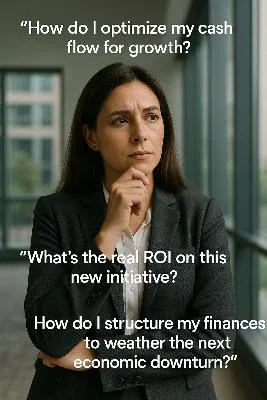
The Psychology of Premium Pricing: Why CFO Services Command Higher Fees
The Psychology of Premium Pricing
Why CFO Services Command Higher Fees
by Joy Francis, CFO & AI Automation Strategist

Figure 1: created by Joy Francis using Flux 1.1 Pro Ultra in Magai
Have you ever wondered why some CPAs charge $150 an hour while others command $500? The difference isn't just experience or credentials—it's psychology.
When I started my journey in finance, I thought pricing was about math. Add up your costs, tack on a reasonable profit margin, and voilà—you have your rate. But after years of helping accounting firms transform their businesses, I've learned something profound: premium pricing isn't about what you do. It's about how your clients perceive the value of what you do.
And nowhere is this more evident than in CFO services.
The Scarcity Principle: Why Rare Feels Valuable
Think about the last time you bought something expensive. Maybe it was a luxury car, a piece of jewelry, or even a high-end consulting service. What made you willing to pay that premium price?
Chances are, it wasn't just the product itself—it was the feeling that you were getting something exclusive, something not everyone could have.
This is the scarcity principle in action, and it's fundamental to understanding why CFO services command higher fees. Unlike traditional accounting services, which every business needs and many providers offer, strategic CFO guidance feels rare and exclusive.
When you position yourself as a CFO, you're not just another accountant in a crowded marketplace. You're a strategic advisor, a business partner, someone who sits at the executive table. There are fewer people who can credibly claim this position, which automatically makes your services feel more valuable.
But here's the key: scarcity only works if it's authentic. You can't just slap "CFO" on your business card and expect clients to pay premium rates. You need to genuinely provide the strategic insight and business acumen that justifies the positioning.
The Authority Bias: Why Expertise Commands Respect
Humans are wired to defer to authority. It's an evolutionary survival mechanism that served our ancestors well, and it still influences our decision-making today.
When a client needs their books balanced, they might shop around for the best price. But when they need strategic financial guidance to navigate a major business decision? They want the expert. They want the authority figure who can confidently guide them through uncertainty.
CFO services tap directly into this psychological bias. The title itself carries weight. Chief Financial Officer. It sounds important, strategic, essential. And because it sounds important, clients are willing to pay important money for it.
This is why your smartest clients are already looking for a virtual CFO, even if they don't realize it yet. They understand intuitively that strategic financial guidance is worth more than basic compliance work.
The Value Perception Paradox
Here's something counterintuitive: sometimes, charging more actually makes your services seem more valuable.
I call this the value perception paradox, and it's rooted in a cognitive bias called the price-quality heuristic. When people can't easily evaluate the quality of a service (and let's face it, most business owners can't objectively assess the quality of financial advice), they use price as a proxy for value.
A $150-per-hour accountant might be seen as adequate for basic needs. But a $500-per-hour CFO? That person must be exceptional. They must have insights and expertise that justify the premium.
This doesn't mean you should arbitrarily raise your prices and hope for the best. But it does mean that underpricing your CFO services can actually hurt your perceived value. When you charge premium rates, you signal to the market that you provide premium value.
The Emotional Investment Factor
Money isn't just currency—it's emotion. The more someone pays for something, the more emotionally invested they become in its success.

When a client pays $2,000 a month for CFO services instead of $500 for basic bookkeeping, they're not just buying a service—they're making an investment in their business's future. And because they're investing more, they're more likely to:
- Take your advice seriously
- Implement your recommendations
Figure 3: created by Joy Francis using Flux 1.1 Pro Ultra in Magai
- View you as a true business partner
- Refer you to other high-value clients
This creates a virtuous cycle. Higher-paying clients are more engaged, which leads to better results, which justifies the premium pricing, which attracts more high-value clients.
The Anchoring Effect: Setting the Right Reference Point
In psychology, anchoring refers to our tendency to rely heavily on the first piece of information we receive when making decisions.

If you lead with your bookkeeping rates, you anchor the client's expectations around commodity pricing. But if you lead with your CFO services, you anchor them around strategic value.
This is why successful CFO service providers often restructure their entire pricing conversation. Instead of saying, "I charge $150 an hour for accounting work, but I also offer CFO services for $400 an hour," they say, "My CFO services are $3,000 per month, and that includes all the financial management and strategic guidance your business needs."
The anchor point completely changes the conversation.
The Trust Premium: Why Relationships Matter
Here's something that might surprise you: the highest-paid CFOs aren't necessarily the most technically skilled. They're the most trusted.
Trust is the ultimate premium pricing strategy because it's the hardest thing to replicate.
Figure 4: created by Joy Francis using Flux 1.1 Pro Ultra in Magai
Anyone can learn accounting software or master financial analysis. But building genuine trust with business owners? That's an art form.
This is why the trust factor is so crucial in CFO services. When business owners trust you with their financial strategy, they're not just buying your time—they're buying peace of mind. And peace of mind is priceless.
The Transformation Promise

Premium pricing works because it promises transformation, not just transaction.
When someone hires a bookkeeper, they're buying a transaction: "Keep my books clean and compliant." When someone hires a CFO, they're buying a transformation: "Help me build a more profitable, sustainable business."
Transformations are inherently more valuable than transactions because they change the client's entire trajectory. A good CFO doesn't just manage finances—they help business
Figure 5: created by Joy Francis using Flux 1.1 Pro Ultra in Magai
owners make better decisions, avoid costly mistakes, and capitalize on opportunities they might have missed.
The Confidence Multiplier
There's another psychological factor at play here: confidence.
When you price your services at premium levels, it forces you to show up differently. You can't just go through the motions when you're charging $5,000 a month for CFO services. You have to bring strategic insights, proactive recommendations, and genuine business acumen.
This confidence multiplier benefits everyone. You become a better advisor because you're being paid to think strategically, not just execute tasks. And your clients get better results because they're working with someone who's fully invested in their success.
The Positioning Power Play
Here's the truth that many accountants struggle to accept: positioning is more powerful than pricing.
You can't just raise your rates and expect clients to pay them. But you can reposition your services around strategic value, and the premium pricing follows naturally.
This is why I help accounting firms implement CFO services as part of their growth strategy. It's not just about adding another revenue stream—it's about fundamentally changing how clients perceive your value.
Making the Psychological Shift
If you're ready to command premium fees for CFO services, you need to make a psychological shift in how you think about your role.

Stop thinking like a service provider and start thinking like a business partner. Stop focusing on hours and start focusing on outcomes. Stop competing on price and start competing on value.
This shift isn't just about marketing—it's about genuinely becoming the strategic advisor your clients need. It's about developing the business acumen, industry knowledge, and strategic thinking skills that justify premium pricing.
The Implementation Reality
Of course, psychology alone isn't enough. You need systems, processes, and tools that support your premium positioning.
This is where automation becomes crucial. When
Figure 6: created by Joy Francis using ChatGPT
you're charging premium rates, clients expect premium service. They want proactive insights, regular communication, and strategic recommendations that help them grow their business.
But you can't deliver this level of service manually without burning out.
Your Next Move
The psychology of premium pricing isn't just theory—it's a practical framework for transforming your practice.
Your smartest clients are already looking for strategic financial guidance. They're willing to pay premium rates for genuine value. The question is: are you positioned to provide it?
The accounting industry is evolving, and the firms that thrive will be those that understand the psychology of value, not just the mechanics of accounting.
Are you ready to make that shift?
Because your clients are waiting for someone they can trust with their financial future. Someone who understands that true CFO work isn't just about managing money—it's about creating possibilities.
And that kind of transformation? It's worth every penny of premium pricing.
The psychology is clear. The opportunity is real. The only question left is: what are you going to do about it?
Get your complimentary copy of “The Cash Flow Crisis Playbook”—the exact 13-week forecasting framework and step-by-step action plans I use to transform panicked client calls into $5,000/month virtual CFO retainers.
Joy has spent over 40 years helping business owners transform their financial futures. She's worked as an accountant and CFO for public companies, taught financial management at Ford Motor Company plants across the country, and now helps CPAs build virtual CFO practices that command premium fees. Her motto: "You can do anything if you set your mind to it."




